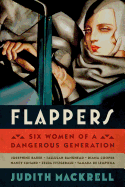
The flapper took on a mythological aspect almost from the moment she first appeared in the 1920s. With her short hair, short skirts and short attention span, she seemed like a new and unsettling breed of woman, another unanticipated aftershock of the First World War.
Judith Mackrell's Flappers explores the phenomenon through the lives of six prominent women who embodied "flapper-ness" for their contemporaries: the African-American dancer Josephine Baker, actress Tallulah Bankhead, Lady Diana Cooper, steamship heiress Nancy Cunard, the Polish-Russian artist Tamara de Lempicka and Zelda Fitzgerald. These women were not the flapper-next-door, though; thanks to both their talents and their excesses, they were tabloid fodder, breaking through the social barriers of gender and class--and, in Baker's case, race--reinventing themselves in the process.
Part of the artistic and intellectual avant-garde, these six women experimented with new social mores and old vices. With no role models to follow, they grappled with the implications of their new independence, with often tragic results. Consequently, Flappers is not short on scandal, but it's ultimately more than a titillating romp through the Jazz Age. Mackrell uses her larger-than-life subjects to illustrate the story of a generation in transition. She skillfully introduces social history on a personal and global scale, from dress reform and birth control to the demographic effects of the war, and ends with a thoughtful consideration of parallels with the youth culture of the 1960s. Sex, drugs and red-hot jazz, anyone? --Pamela Toler, blogging at History in the Margins

